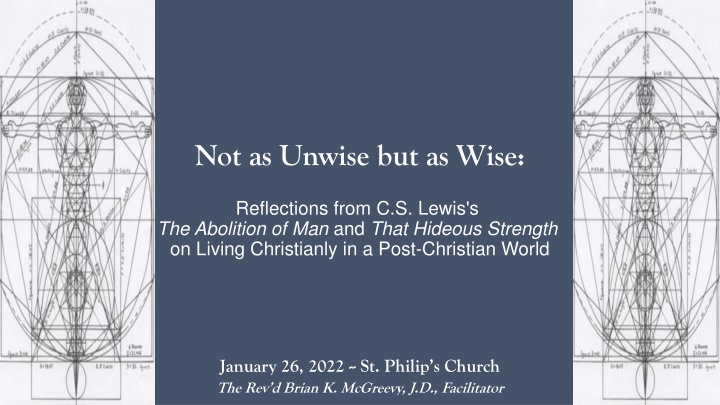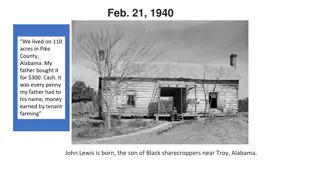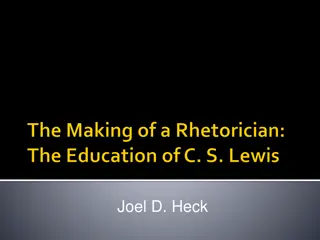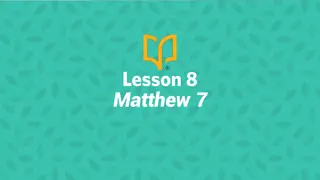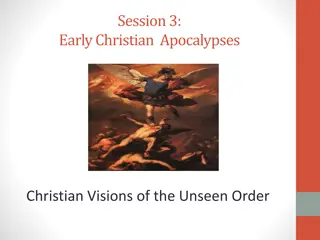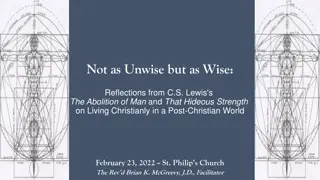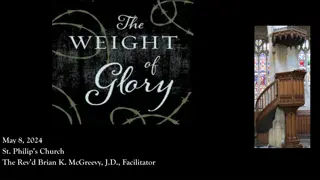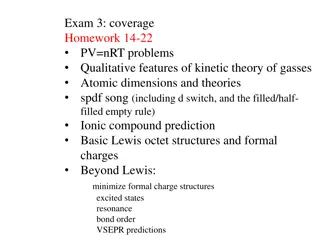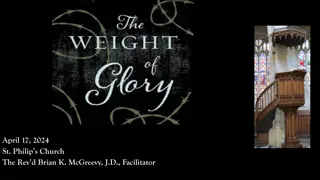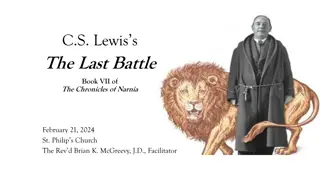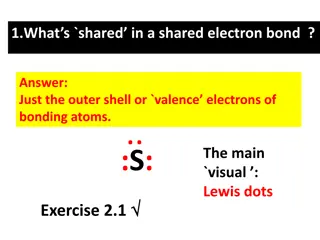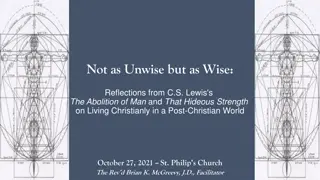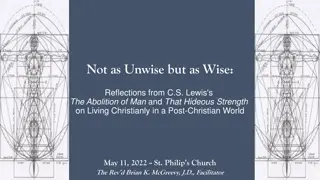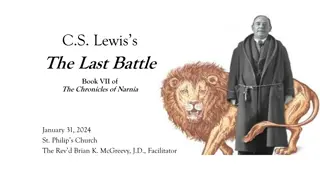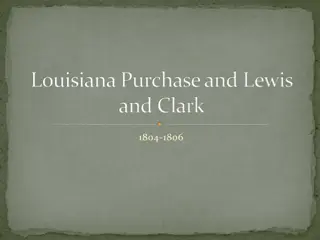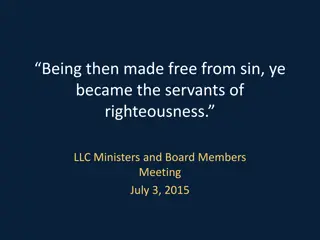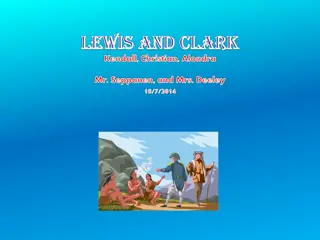Living Wisely in a Post-Christian World: Reflections on C.S. Lewis's Works
Reflections on living as a Christian in a post-Christian world through the analysis of C.S. Lewis's "The Abolition of Man" and "That Hideous Strength." Themes explored include the importance of objective values, the role of Natural Law, and the battle between Good and Evil as portrayed in Lewis's Ransom Trilogy. The class aims to unpack the meaning of Lewis's works, understanding their relevance today, and responding with hope and wisdom rooted in Scriptures.
Download Presentation

Please find below an Image/Link to download the presentation.
The content on the website is provided AS IS for your information and personal use only. It may not be sold, licensed, or shared on other websites without obtaining consent from the author.If you encounter any issues during the download, it is possible that the publisher has removed the file from their server.
You are allowed to download the files provided on this website for personal or commercial use, subject to the condition that they are used lawfully. All files are the property of their respective owners.
The content on the website is provided AS IS for your information and personal use only. It may not be sold, licensed, or shared on other websites without obtaining consent from the author.
E N D
Presentation Transcript
Not as Unwise but as Wise: Reflections from C.S. Lewis's The Abolition of Man and That Hideous Strength on Living Christianly in a Post-Christian World January 26, 2022 -- St. Philip s Church The Rev d Brian K. McGreevy, J.D., Facilitator
For at one time you were darkness, but now you are light in the Lord. Walk as children of light (for the fruit of light is found in all that is good and right and true), and try to discern what is pleasing to the Lord. Take no part in the unfruitful works of darkness, but instead expose them. For it is shameful even to speak of the things that they do in secret. But when anything is exposed by the light, it becomes visible, for anything that becomes visible is light. Therefore it says, Awake, O sleeper, and arise from the dead, and Christ will shine on you. Look carefully then how you walk, not as unwise but as wise, making the best use of the time, because the days are evil. Therefore do not be foolish, but understand what the will of the Lord is. Ephesians 5: 8-17
How to approach this class: --On the beach --Snorkeling --Scuba diving --Email list How to read That Hideous Strength: --One chapter at a time --Make a chart of characters --Look for and note where themes from The Abolition of Man appear What we ll be doing each week: --Examining context and establishing a framework for appreciating these books --Unpacking the meaning of Lewis s works --Exploring their relevance for today --Considering how we can respond with practices of Hope and of Wisdom rooted in the Scriptures
REVIEW FROM PREVIOUS CLASSES Summary: Main theme of each chapter in The Abolition of Man 1. Men without Chests : The importance of objective values and the poison of subjectivism 2. The Way : Why the Tao, or Natural Law, is the sole source of all value judgments 3. The Abolition of Man : Man s control of Nature is in reality a means for some men (Conditioners) to control other men, using Nature as their instrument. To see through (deconstruct) all things is not to see at all. PLOT SUMMARY OF THE RANSOM TRILOGY Adapted from Taylor Dinerman, The Space Review -- Out of the Silent Planet, tells how Ransom, a Cambridge don on holiday, is kidnapped by the physicist Weston and his partner Devine, a sleazy businessman, and taken to Malacandra (Mars), supposedly as a human sacrifice. Once on Mars he escapes, hides in a Martian village, and learns to speak the local language. He learns that each planet has its own tutelary spirit essentially an angel or archangel called an Oyarsa, who rules under the authority of God. Earth, unfortunately, is the central battleground between Good and Evil and is ruled by a fallen angel, a dark Oyarsa. -- Perelandra, the name Lewis gives to Venus, is also the title of the second book in the series. Retelling the story of Adam and Eve, it is the most explicitly biblical of the three. Weston plays the role of the serpent sent to tempt the woman who is to become the mother of the world into rejecting God s will. Ransom is sent by the Oyarsa to challenge the evil one and to save Venus from the fate of Earth. -- That Hideous Strength combines a sordid tale of intra-university politics, Arthurian legend, and spiritual combat. In a small British University town, one of the colleges finds itself seduced and then engulfed by the newly established National Institute for Coordinated Experiments (N.I.C.E). This organization is secretly controlled by a pair of initiates, who plan to revive the wizard Merlin from his long, enchanted slumber and to use his powers for their own malevolent purposes. To find him they need the services of a seer ; Jane Studdock, the wife of Mark Studdock, a shallow young sociologist entrapped by promises of power, money, and above all membership in the secret, elite clique that controls the N.I.C.E. Ransom leads a small eccentric company of friends who, with the aid of the Oyarsa, take on and defeat them.
The shadow of that hyddeous strength, sax myle and more it is of length (Sir David Lyndsay: from Ane Dialog, describing the Tower of Babel) This is a tall story about devilry, though it has behind it a serious point which I have tried to make in my Abolition of Man. from Preface to That Hideous Strength CHARACTERS IN ORDER OF APPEARANCE --Jane (Tudor) Studdock She had not been to church since her schooldays until she went there six months ago to be married. Jane married Mark six months before the story begins, leaving behind a career she enjoyed. Since then, she works on her doctoral thesis on John Donne, but makes no progress. Before marriage, they had endless talks, but since marriage, she feels alone in solitary confinement. She does not wish for children, as they would impede her career as a scholar. She has nightmares of a man beheaded by having his head twisted off by some other men speaking French. She is disturbed when she sees a picture in a newspaper of precisely what she dreamed. Her dream also includes an ancient bearded Druidical man. Francois Alcasan - An Arabian radiologist who poisoned his wife. He was beheaded for this crime. However, before his execution, Jane sees him in a dream being beheaded by twisting his head off. Jane saw in a man in a dream approach him and speak with him in French (which she did not understand). --Merlin - the ancient Druidical bearded man in a mantle from Arthurian days who also appears in Jane s dream. Merlin has a pagan past but has also been deeply influenced by early British Christianity. -Mark (Gainsby) Studdock - A Fellow in Sociology for 5 years at Bracton College. He talks with Sub-Warden Curry and discovers, to his delight, he is now part of the inner circle, the progressive element. He married his wife Jane six months ago, and they are drifting apart. Mark learns that Lord Feverstone influenced Mark s appointment to Bracton. --
--Sub-Warden Curry - Curry serves as the effective head of Bracton College, who thinks the NICE "marks the beginning of a new era - the really scientific era." Curry wants to cultivate Mark to use him to support his agenda for the college. --James Busby Bursar at Bracton College and another member of the 'Progressive Element . --Canon Jewel A sensible and admired elderly Fellow at Bracton College who is a retired clergyman and a brilliant intellect, but excluded by the 'Progressive Element' for being an 'obstructionist'. --Lord Feverstone - His real name is Dick Divine, who has appeared in the prior stories of the Space Trilogy as a villain. Mark discovers Feverstone as the person responsible for getting his position at Bracton College over another prospect, Denniston. Once Curry and Busby, the Bursar, leave, Mark discovers Feverstone holds them in disdain, but finds them useful in running He joins in cultivating Mark as part of the inner circle of the progressive element in the college. --Arthur Denniston - an old friend of Mark s from university who is also a sociologist and Mark s professional rival. When explaining to Mark why they chose him over Denniston, Sub-Warden Curry says, One sees now that Denniston would never have done. Most emphatically not. A brilliant man at that time, of course, but he seems to have gone quite off the rails since then with all his Distributivism and what not. They tell me he s likely to end up in a monastery. --The Dimbles a professor of English literature at Northumberland College and his wife, with whom Jane Studdock studied and socialized as a college student. The Dimbles live adjacent to Bragdon Wood. --Grace Ironwood The seemingly stern but kind psychologist and doctor who helps Jane interpret her dreams. Inspired by the J rnvi r ("Iron-Wood") of Norse mythology (female giants), her name is softend with the Christian name "Grace". --Ivy Maggs part-time housekeeper for Jane Studdock, who considers her a terrible talker. --John Wither Deputy Director of the N.I.C.E. characterized by vague conversation that is impossible to pin down and a sense of not being fully present; his eyes seem to indicate that he is far away elsewhere. --William Hingest (a.k.a. Bill the Blizzard ) a brilliant scientist from Bracton College who is now employed at the N.I.C.E. but has decided to leave there and warns Mark of the corrupt powers of the N.I.C.E. --Professor Filostrato an eminent Italian physiologist who works for the N.I.C.E. who takes an interest in Mark -- Fairy Hardcastle the aggressive head of the Secret Police of the N.I.C.E.
REVIEW OF CHAPTER 1, SALE OF COLLEGE PROPERTY --Jane and her dreams --Mark and the Inner Circle at Bracton College --The proposal to sell Bragdon Wood and Merlin s Well to the N.I.C.E. --The Dimbles and rumors of Merlin REVIEW OF CHAPTER 2, DINNER WITH THE SUBWARDEN --Mark and being included in Feverstone s confidence in disdain of Curry and Busby --The N.I.C.E. as the ultimate Inner Circle/Ring , focused on taking over and reconditioning the human race, controlling and subduing Nature, and exerting control over the interplanetary wars --Jane s fears and vulnerability, which she later rejects as unworthy --Mark s journey to Belbury and Jane s journey to St. Anne s-on-the-Hill SUMMARY OF CHAPTER 3, BELBURY AND ST. ANNE S-ON-THE-HILL --adapted from Rudy Rentzel Upon arriving at Belbury, the Headquarters of the N.I.C.E., Lord Feverstone takes Mark to meet John Wither, the Deputy Director of the N.I.C.E., who exemplifies the mastery of double-speak (and Lewis s fondness for using names to convey meaning). He speaks many words but without really saying anything at all, or he says one thing while meaning another. He praises Mark effusively (while at the same time not really seeming to know who he is) and repeatedly reassures Mark that he has nothing to worry about at all. Mark simply wants to know what his job would be if he came to the N.I.C.E. but can never get a direct answer out of Wither, and wonders throughout the interview, "What are we talking about? Afterward, Mark is unclear whether or not he has been offered a job.
Mark spots William Hingest, a prominent chemist at Bracton, and is relieved to have someone to talk to. However, Hingest says right away that he is leaving the N.I.C.E. and advises Mark to do the same. Mark is torn and confused when he is introduced to Steele and Cosser, who direct the work of the N.I.C.E. in Mark s discipline of sociology, and they say they know nothing about his appointment and they don t need him. A famous physiologist, Professor Filostrato, recognizes Mark. He advises Mark to stay and not worry about a job description or about Steele and Cosser. Filostrato says that all will become apparent and that the work of the N.I.C.E. is what's important - too important to pass up. He advises that the only two people in the N.I.C.E. Mark needs to pay attention to are Wither, the Deputy Director, and "Fairy" Hardcastle, the head of the internal N.I.C.E. police. The "Fairy" is "a big woman in a black, short-skirted uniform." Meanwhile, Jane is admitted through the gate to St. Anne's-on-the-Hill, and meets Grace Ironwood, the person the Dimbles wanted her to see about her dreams. Miss Ironwood dresses all in black with her hands folded on her knees, just as she had appeared in Jane s dream the night before. Ironwood reassures Jane that her dreams are not an indication that she is mentally ill but rather that she is a visionary, who sees things in dreams as they happen or before they happen. Jane's maiden name was Tudor, and Ironwood explains that several of Jane s ancestors in this family had the same gift. Ironwood urges Jane to use her gift in service of the company at St. Anne's, as recommended by the Dimbles, and warns Jane that there are others wanting to use her gift for subversive purposes and evil. Jane is almost convinced, but then her pride and wounded vanity and dislike of mystery and circumstances beyond her control cause her to rebel and to flee, saying she wants nothing more to do with Ironwood or the Company. On the other journey, Mark stayed the night at Belbury, spending time with the Fairy, whom he finds wholly unattractive and overly sexualized in a nasty way. She is aware of his reaction and finds it amusing. She suggests they work hand in hand, since she viewed police work as largely the work of a sociologist (which Mark is), and Mark again is deeply impressed with the enjoyable sensation of becoming part of the Inner Circle. Like Filostrato, she urges Mark to consider himself to have the job, and not worry about the job description.
Leaving St. Annes, Jane determines again not to get mixed up in all this nonsense. She redoubles her determination to live her own life unfettered, as she did before she married Mark., meanwhile feeling resentment against love, and thus against Mark, for invading her life. She dwells on how much she believes women give up in getting married and resents how Mark and other men are insufficiently aware of this, furthering her resolve not to have a child, at least for a long time. Reaching home, she receives a call from Mother Dimble, who is having a crisis and begs to come see Jane. KEY PASSAGES IN SECOND PART OF CHAPTER THREE Mark did not ask again in so many words what the N.I.C.E. wanted him to do; partly because he began to be afraid that he was supposed to know this already, and partly because a perfectly direct question would have sounded a crudity in that room a crudity which might suddenly exclude him from the warm and almost drugged atmosphere of vague, yet heavily important, confidence in which he was gradually being enfolded. Inner Ring Eh? What s that? College Meeting? said the Blizzard. What were they talking about? About the sale of Bragdon Wood. All nonsense, muttered the Blizzard. I hope you would have agreed with the decision we came to. It made no difference what decision they came to. Oh! said Mark with some surprise. It was all nonsense. The N.I.C.E. would have had the Wood in any case. They had powers to compel a sale. What an extraordinary thing! I was given to understand they were going to Cambridge if we didn t sell. Hingest sniffed loudly. Not a word of truth in it. As to its being an extraordinary thing, that depends on what you mean. There s nothing extraordinary in the Fellows of Bracton talking all afternoon about an unreal issue. And there s nothing extraordinary in the fact that the N.I.C.E. should wish, if possible, to hand over to Bracton the odium of turning the heart of England into a cross between an abortive American hotel and a glorified gas works. The only real puzzle is why the N.I.C.E. should want that bit of land. Lies, deathworks
I have a strong objection to being put in a false position began Mark. Listen, my friend, interrupted Filostrato, you must put all such ideas out of your head. The first thing to realise is that the N.I.C.E. is serious. It is nothing less than the existence of the human race that depends on our work: our real work, you comprehend? You will find frictions and impertinences among this canaglia, this rabble. They are no more to be regarded than your dislike of a brother officer when the battle is at its crisis. As long as I m given something to do that is worth doing, said Mark. usurping God The woman led her along a brick path beside a wall on which fruit trees were growing, and then to the left along a mossy path with gooseberry bushes on each side. Then came a little lawn with a see-saw in the middle of it, and beyond that a greenhouse. Here they found themselves in the sort of hamlet that sometimes occurs in the purlieus of a large garden walking in fact down a little street which had a barn and a stable on one side and, on the other, a second greenhouse, and a potting shed and a pigstye inhabited, as the grunts and the not wholly agreeable smell informed her. After that were narrow paths across a vegetable garden that seemed to be on a fairly steep hillside, and then, rose bushes, all stiff and prickly in their winter garb. At one place, they were going along a path made of single planks. This reminded Jane of something. It was a very large garden. it was like like yes, now she had it: it was like the garden in Peter Rabbit. Or was it like the garden in the Romance of the Rose? No, not in the least like really. Or like Klingsor s garden? Or the garden in Alice? Or like the garden on the top of some Mesopotamian ziggurat which had probably given rise to the whole legend of Paradise? Or simply like all walled gardens? Freud said we liked gardens because they were symbols of the female body. But that must be a man s point of view. Presumably gardens meant something different in women s dreams. Or did they? Did men and women both feel interested in the female body and even, though it sounded ridiculous, in almost the same way? A sentence rose to her memory. The beauty of the female is the root of joy to the female as well as to the male, and it is no accident that the goddess of Love is older and stronger than the god. Where on earth had she read that? And, incidentally, what frightful nonsense she had been thinking for the last minute or so! She shook off all these ideas about gardens and determined to pull herself together. A curious feeling that she was now on hostile, or at least alien, ground warned her to keep all her wits about her. the fruitful garden, Eden, beauty, male and female imago dei
[She took up the book and read the words]: The beauty of the female is the root of joy to the female as well as to the male, and it is no accident that the goddess of Love is older and stronger than the god. To desire the desiring of her own beauty is the vanity of Lilith, but to desire the enjoying of her own beauty is the obedience of Eve, and to both it is in the lover that the beloved tastes her own delightfulness. As obedience is the stairway of pleasure, so humility is the At that moment the door was suddenly opened. Jane turned crimson as she shut the book and looked up. a sign or showing, ignored Disappointment shadowed Jane s face. Then can t anything be done about it? They were horrible dreams horribly vivid, not like dreams at all. I can quite understand that. Is it something that can t be cured? The reason you cannot be cured is that you are not ill. But there must be something wrong. It s surely not natural to have dreams like that. There was a pause. I think, said Miss Ironwood, I had better tell you the whole truth. Yes, do, said Jane in a strained voice. The other s words had frightened her. And I will begin by saying this, continued Miss Ironwood. You are a more important person than you imagine. Jane said nothing, but thought inwardly, She is humouring me. She thinks I am mad. What was your maiden name? asked Miss Ironwood. Tudor, said Jane. At any other moment she would have said it rather sell-consciously, for she was very anxious not to be supposed vain of her ancient ancestry. The Warwickshire branch of the family? Yes. Vision the power of dreaming realities is sometimes hereditary, said Miss Ironwood. Something seemed to be interfering with Jane s breathing. She felt a sense of injury this was just the sort of thing she hated: something out of the past, something irrational and utterly uncalled for, coming up from its den and interfering with her. purpose, gifting, God s plan, selfish rebellion My opinion is that you have seen real things in your dreams. You have seen Alcasan as he really sat in the condemned cell, and you have seen a visitor whom he really had. But but oh, this is ridiculous, said Jane. That part was a mere coincidence. The rest was just a nightmare. It was all impossible. He screwed off his head, I tell you. And they dug up the horrible old man. They made him come to life. There are some confusions there But in my opinion there are realities behind even those episodes. I am afraid I don t believe in that sort of thing, said Jane coldly. willful unbelief
Your upbringing makes it natural that you should not, replied Miss Ironwood. Unless, or course, you have discovered for yourself that you have a tendency to dream real things. Jane thought of the book on the table which she had apparently remembered before she saw it, and then there was Miss Ironwood s own appearance that too she had seen before she saw it But it must be nonsense. Can you then do nothing for me? I can tell you the truth, said Miss Ironwood. I have tried to do so. I mean, can you not stop it cure it? Vision is not a disease. But I don t want it, said Jane passionately. I must stop it. upbringing/education, rejection of identity and gifting, self-determination We know your dreams to be partly true because they fit in with information we already possess. It was because he saw their importance that Dr. Dimble sent you to us. Do you mean he sent me here not to be cured but to give information? said Jane. The idea fitted in with things she had observed in his manner when she first told him. Exactly. I wish I had known that a little earlier, said Jane coldly, and now definitely getting up to go. I m afraid it has been a misunderstanding. I had imagined Dr. Dimble was trying to help me. He was. But he was also trying to do something more important at the same time. I suppose I should be grateful for being considered at all, said Jane drily, and how, exactly, was I to be helped by by all this sort of thing? The attempt at icy irony collapsed as she said these last words and red, undisguised anger rushed back into her face. In some ways she was very young. Young lady, said Miss Ironwood, You do not at all realise the seriousness of this matter. The things you have seen concern something compared with which the happiness, or even the life, of you and me, is of no importance. I must beg you to face the situation. You cannot get rid of your gift. You can try to suppress it, but you will fail, and you will be very badly frightened. On the other hand, you can put it at our disposal. If you do so, you will be much less frightened in the long run and you will be helping to save the human race from a very great disaster. Or thirdly. you may tell someone else about it. If you do that, I warn you that you will almost certainly fall into the hands of other people who are at least as anxious as we to make use of your faculty and who will care no more about your life and happiness than about those of a fly. The people you have seen in your dreams are real people. It is not at all unlikely that they know you have, involuntarily, been spying on them. And, if so, they will not rest till they have got found of you. I would advise you, even for your own sake, to join our side. --obedience as valuable for the individual and the world, the importance of individuals and of using gifts, spiritual warfare
Several times that day he had been made to feel himself an outsider; that feeling completely disappeared while Miss Hardcastle was talking to him. He had the sense of getting in. Miss Hardcastle had apparently lived an exciting life. She had been, at different times, a suffragette, a pacifist, and a British Fascist. She had been manhandled by the police and imprisoned. On the other hand, she had met Prime Ministers, Dictators, and famous film stars; all her history was secret history. She knew from both ends what a police force could do and what it could not, and there were in her opinion very few things it could not do. danger of inner circle and celebrity culture Mark gathered that for the Fairy, the police side of the Institute was the really important side. It existed to relieve the ordinary executive of what might be called all sanitary cases a category which ranged from vaccination to charges of unnatural vice from which, as she pointed out, it was only a step to bringing in all cases of blackmail. As regards crime in general, they had already popularised in the press the idea that the Institute should be allowed to experiment pretty largely in the hope of discovering how far humane, remedial treatment could be substituted for the old notion of retributive or vindictive punishment. That was where a lot of legal Red Tape stood in their way. But there are only two papers we don t control, said the Fairy. And we ll smash them. You ve got to get the ordinary man into the state in which he says Sadism automatically when he heard the word Punishment. And then one would have carte blanche . Mark did not immediately follow this. But the Fairy pointed out that what had hampered every English police force up to date was precisely the idea of deserved punishment. For desert was always finite: you could do so much to the criminal and no more. Remedial treatment, on the other hand, need have no fixed limit; it could go on till it had effected a cure, and those who were carrying it out would decide when that was, And if cure were humane and desirable, how much more prevention? Soon anyone who had ever been in the hands of the police at all would come under the control of the N.I.C.E.; in the end, every citizen, And that s where you and I come in, Sonny, added the Fairy, tapping Mark s chest with her forefinger. There s no distinction in the long run between police work and sociology.You and I ve got to work hand in hand. health and sanitary practice as gateway to government control, manipulation and control of the media, redefining of terms to demonize normal practices, ever-growing reach of government
I came here because I thought it had something to do with science. Now that I find its something more like a political conspiracy, I shall go home. I m too old for that kind of thing, and if I wanted to join a conspiracy, this one wouldn t be my choice. You mean, I suppose, that the element of social planning doesn t appeal to you? I can quite understand that it doesn t fit in with your work as it does with sciences like Sociology, but There are no sciences like Sociology. And if I found chemistry beginning to fit in with a secret police run by a middle-aged virago who doesn t wear corsets and a scheme for taking away his farm and his shop and his children from every Englishman, I d let chemistry go to the devil and take up gardening again. true science v. scientism/political conspiracy, danger of amoral agents of control That s what happens when you study men: you find mare s nests. I happen to believe that you can t study men: you can only get to know them, which is quite a different thing. Because you study them, you want to make the lower orders govern the country and listen to classical music, which is balderdash. You also want to take away from them everything which makes life worth living and not only from them but from everyone except a parcel of prigs and professors. treating humans as individuals bearing the image of God, not as lab experiments to be controlled/suppressed/ improved I suppose there are two views about everything, said Mark. Eh? Two views? There are a dozen views about everything until you know the answer. Then there s never more than one. But it s no affair of mine. Good night. Absolute Truth
Themes in Chapter 3 Lies (ends justify means) and works of death Usurping God s role The fruitful garden and beauty Male and female imago Dei Signs and gifts God s purposes Selfish rebellion Willful unbelief and disobedience Upbringing/education Rejection of identity and gifting leading to self-determination Obedience as valuable for the individual and the world Importance of each individual and of using gifts Spiritual warfare Danger of lure of inner circle and celebrity culture Health and sanitary practice as gateway to government control Manipulation and control of the media Redefining of terms to demonize normal practices Ever-growing reach of government True science v. scientism/political conspiracy Danger of amoral agents of control Treating humans as image bearers, not as lab experiments to be controlled/suppressed/ improved Absolute Truth
Practices of Hope and of Wisdom Finally, brothers, whatever is true, whatever is honorable, whatever is just, whatever is pure, whatever is lovely, whatever is commendable, if there is any excellence, if there is anything worthy of praise, think about these things. What you have learnedand received and heard and seen in me practice these things, and the God of peace will be with you. Philippians 4:8-9 1. Pray that the eyes of your heart may be enlightened I pray that the eyes of your heart may be enlightened in order that you may know the hope to which he has called you, the riches of his glorious inheritance in his holy people, and his incomparably great power for us who believe. (Eph. 1:18-19) The eye is the lamp of the body. So, if your eye is healthy, your whole body will be full of light, but if your eye is bad, your whole body will be full of darkness. If then the light in you is darkness, how great is the darkness! (Matt. 6:22-23) 2. Soak in Scripture for sanctification. Sanctify themin the truth; your word is truth. As you sent me into the world, so I have sent them into the world. And for their sake I consecrate myself,that they also may be sanctifiedin truth.(John 17:17-19) For the word of God is living and active, sharper than any two-edged sword, piercing to the division of soul and of spirit, of joints and of marrow, and discerning the thoughts and intentions of the heart. (Heb. 4:12) 3. Seek out what your spiritual gifts are, use them, and seek to draw out and encourage the spiritual gifts of others. Having gifts that differ according to the grace given to us, let us use them: if prophecy, in proportion to our faith; if service, in our serving; the one who teaches, in his teaching; the one who exhorts, in his exhortation; the one who contributes, in generosity; the one who leads,with zeal; the one who does acts of mercy, with cheerfulness. (Romans 12:6-9)For I long to see you, that I may impart to you some spiritual gift to strengthen you 12that is, that we may be mutually encouraged by each other's faith, both yours and mine. (Romans 1:11) 4. Resist the standards of the world, which would remake identity, redefine language and reject Absolute Truth, by holding fast to a Christian worldview. Do not be conformed to this world, but be transformed by the renewal of your mind, that by testing you may discern what is the will of God, what is good and acceptable and perfect. (Rom. 12:2) See to it that no one takes you captive by philosophy and empty deceit, according to human tradition, according to the elemental spirits of the world, and not according to Christ. (Col.2:8)
THE HOLY SCRIPTURES --George Herbert (1593-1633) Oh Book! infinite sweetnesse! let my heart Suck ev'ry letter, and a honey gain, Precious for any grief in any part; To cleare the breast, to mollifie all pain. Thou art all health, health thriving, till it make A full eternitie; thou art a masse Of strange delights, where we may wish and take. Ladies, look here; this is the thankfull glasse, That mends the looker's eyes: this is the well That washes what is shows. Who can indeare Thy praise too much? thou art Heav'n's lidger here, Working against the states of death and hell. Thou art joyes handsell: heav'n lies flat in thee, Subject to ev'ry mounters bended knee.
For at one time you were darkness, but now you are light in the Lord. Walk as children of light (for the fruit of light is found in all that is good and right and true), and try to discern what is pleasing to the Lord. Take no part in the unfruitful works of darkness, but instead expose them. For it is shameful even to speak of the things that they do in secret. But when anything is exposed by the light, it becomes visible, for anything that becomes visible is light. Therefore it says, Awake, O sleeper, and arise from the dead, and Christ will shine on you. Look carefully then how you walk, not as unwise but as wise, making the best use of the time, because the days are evil. Therefore do not be foolish, but understand what the will of the Lord is. Ephesians 5: 8-17
